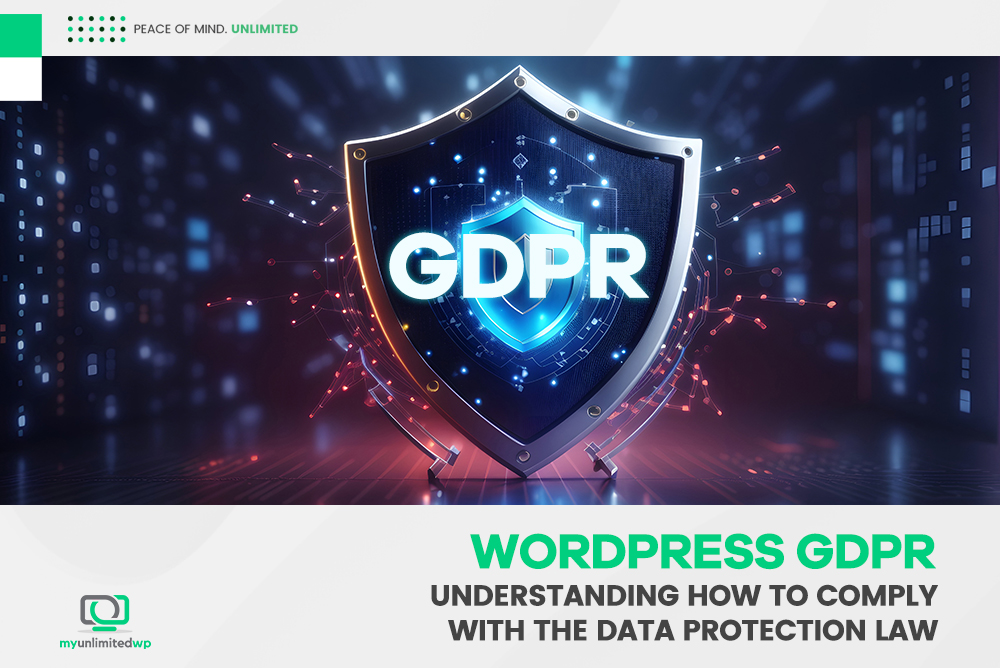Overview: Learn how to make your WordPress site GDPR-compliant to avoid fines and build trust with your users. Follow our best practices to create a secure, transparent, and user-friendly website. Read on to learn more!
Phishing attacks deceive users into revealing sensitive information through fraudulent emails, malicious websites, or deceptive pop-up messages. Data leakage involves the unauthorized transfer of sensitive information due to inadequate security measures, insider threats, or system vulnerabilities.
Considering these issues, with the implementation of the General Data Protection Regulation (GDPR) by the European Union, businesses worldwide must reassess their data handling practices to avoid hefty fines and build audience trust.
For WordPress website owners, understanding and complying with GDPR is essential. In addition to GDPR compliance, safeguarding against cyber threats like phishing attacks and data leakage is crucial.
What is WordPress GDPR?
WordPress GDPR refers to the process of ensuring that a WordPress site complies with the General Data Protection Regulation (GDPR). The primary objective is to safeguard every user’s personal data using various WordPress features and additional tools.
To better understand GDPR, here are three essential terms you should know:
-
Personal Data: Any information relating to an individual, including their name, identification number, location, and cultural and social identity.
-
Controller: A legal entity, public authority, agency, or other body that determines the purpose and means of processing personal data.
-
Processor: Any party that processes personal data on behalf of the controller.
Now, let’s explore how GDPR impacts website owners and six crucial methods to make your WordPress site GDPR-compliant.
Who Needs to Comply with WordPress GDPR?
GDPR compliance isn’t just for businesses and organizations within the EU. If you collect and process personal data from customers in EU countries, or if you offer products and services to EU-based customers, you need to comply. This means almost all international-scale businesses and website owners must adhere to these regulations.
Why is this important? Failing to comply with GDPR can lead to significant fines. For instance, the Information Commissioner’s Office (ICO) can impose fines for smaller offenses up to €10 million or 2% of the company’s annual global revenue, whichever is higher. That’s a hefty price to pay for neglecting data protection.
But it’s not just about avoiding fines. Making your WordPress site GDPR-compliant is crucial because customers now value their data privacy more than ever. In fact, about 80% of site users say they would stop interacting with a brand if their data was used without their knowledge or consent — which is fair, to say the least!
For those outside the EU, it’s essential to note that other regions have similar regulations, such as the California Consumer Privacy Act (CCPA) and the Personal Data Protection Act (PDPA). Ensuring compliance with these laws is just as critical.
In short, prioritizing GDPR compliance not only protects you from financial penalties but also builds trust and loyalty among your users, showing them that you respect and safeguard their personal information.
What Are WordPress GDPR Requirements?
To comply with GDPR, WordPress site owners must adhere to six key principles:
Data Minimization: Collect only the necessary personal information and use it solely for specified, explicit, and legitimate purposes.
Transparency: Clearly communicate data collection and processing practices to users. A common method is including a data processing agreement, such as a cookie notice.
Integrity and Confidentiality: Ensure the security of stored personal data by minimizing the risk of hacking and accidental loss. Promptly send data breach notifications if an incident occurs.
Storage Limitation: Do not keep personal data longer than necessary, unless it serves the public interest.
Accuracy: Maintain accurate and up-to-date personal data. Correct or erase data if it is found to be inaccurate.
Purpose Limitation: Use collected personal data only for the specified, explicit, and legitimate purposes.
By practicing these principles, WordPress site owners can ensure their sites are GDPR-compliant and avoid potential legal accountability.
WordPress GDPR and Individual Rights
GDPR grants specific rights to site users, especially EU citizens, to protect their personal data. Chapter three of the GDPR outlines these rights, divided into six key sections:
Right of Access: Users have the right to know why their data is being collected and processed, what data is being collected, and where it will be distributed. They can also obtain a copy of the data being processed.
Right of Rectification: Users can request corrections to their data if it is inaccurate. They also have the right to add more information based on the purpose of the processing.
Right to Erasure: Users can request the deletion of their personal data from your database.
Right to Restriction of Processing: Individuals can deny the processing of their personal data.
Right to Data Portability: Users can receive a copy of their data in a commonly used and readable format and can distribute this copy without restrictions.
Right to Object: Users can object to profiling for certain purposes, such as direct marketing.
Understanding and respecting these rights is crucial for GDPR compliance and building trust with your users.
In Summary
Making your WordPress site GDPR-compliant is essential for avoiding fines and building trust with your users. By implementing the best practices outlined in this blog, you can create a secure, transparent, and user-friendly website.
Remember that GDPR compliance is an ongoing process that requires regular updates and vigilance. Stay informed about the latest regulations and integrate the necessary tools and practices to keep your users’ data safe.
If you need expert assistance to make your WordPress site GDPR-compliant or for any other WordPress-related support, MyUnlimitedWP is here to help. Our team of professionals offers comprehensive WordPress support to ensure your site runs smoothly and securely.
Contact us today to learn more about our services and how we can assist you in managing and optimizing your WordPress site.
Visit MyUnlimitedWP to get started!

